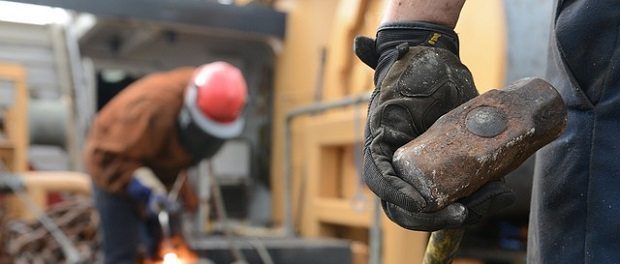[dropcap style=”font-size:100px; color:#992211;”]Y[/dropcap]ou should always be wary of people who talk and think in clichés.
Their thinking is flawed and low-minded and they are, without exception, unpleasant and often vicious people for precisely that reason. So I always groan with a vengeance when politicians and the media lionise ‘hard work’, ‘hard-working families’ and the innate salt-of-the-earth virtue of the ‘hard worker’.
David Cameron leads the charge, though the media – even the BBC – has a curious fixation on ‘Saints and Shirkers’ as a whole too. His speeches are full of “hardworking families” (does this include toddlers?), he believes in “working hard”, extols the virtue of “hardworking men and women” and calls for “reward for hard work.”
Indeed he puts so much effort into droning on about hard work, it seems he barely has any time to do it. But he is not alone in worshipping at the shrine of the hard worker. The Lib Dems and UKIP also like to idolise the eager beaver, working 10 hour shifts and barely seeing Mrs. Beaver and all the little beavers.
Meanwhile, Labour, even under Jeremy Corbyn, bangs on about it non-stop at a rate that would make a Tory blanch. Their 2015 manifesto described itself as “a plan to reward hard work”, it praises “the countless people working as hard as they possibly can”, it extols the British belief in “the value of hard work” and generally makes the point flash on and off with LED lightbulbs as it says “our country’s greatest asset is the hard work and talent of our people.” Note that hard work comes before talent. Know your place. Always.
Apart from it sounding both patronising and fake (David Cameron is noted for both his passion for chillaxing and sleeping on the job), it also comes with an ugly subtext. If you are not ‘hard-working’, it is implied that you are ‘other’, a leech on society, a contemptible good-for-nothing. Naturally, people who can’t work hard, and who don’t have a million or so in the bank, are stigmatised.
The Daily Mail and the rest of the press can always dig up some track-suited mother with 14 kids by 20 different fathers, living in a mansion and getting free Sky TV from the benefits office. That this doesn’t even slightly reflects the bleak and grotty reality of many benefits claimants’ day-to-day lives is beside the point. We just KNOW these people are not hard working. They are not-us. We are superior because we work hard. We are valued by our betters. The newspapers and media tell us we’re good. But THEY are not good. They are shirkers. They are dossers, layabouts, filth, lice.…
This is, of course, just another phase in the world’s oldest ongoing colonial enterprise – the relentless divide and rule imposed on the British by their rulers. In this sense, the masses are complicit in their own hoodwinking. They love to be flattered by people their ancestors used to tug their forelocks at. They also love to despise people whom they deem to be lesser than them, be it the disabled being bullied by ATOS, single parents on benefits or ‘the undeserving poor’, so-called because they apparently receive without giving and generally take the mickey, like the ruling class but without the airs and graces.
If, however, we look at the sort of ‘hard-working’ societies Cameron et al are so fond of, we’d see that hard work does not necessarily benefit the hard workers. China’s booming growth has been unevenly distributed and the suicide nets set up around the Foxconn factory tell their own story. Japan remains wedded to long, long working hours but equally wedded to stagnation and inefficiency in equal measure.
Hard work in the USA, meanwhile, has resulted in median household incomes stalling from the 1970s onwards even as the cost of living, housing, education and healthcare have risen relentlessly. Productivity continues to suffer. It’s almost as if working yourself to the bone isn’t actually beneficial in the long run. Who’d have thought it?
Beyond the practical side of the argument, there is also the idea of hard work that is so problematic. Smacking, as it does, of joyless protestant grind for joyless protestant grind’s sake, it is not as virtuous as it may claim.
But why is ‘hard work’ in and of itself a false virtue? Well let’s look at the first example. We have a nurse and a paramedic. The nurse works in an ICU and toils for hours in order to keep one particular patient alive. His efforts pay off and the patient lives, recovers and is healthy once more.
The paramedic, meanwhile, rushes to the scene of a trauma. Someone with a nut allergy has reacted badly to something they’ve eaten and are in danger of dying from anaphylactic shock. The paramedic evaluates the situation and promptly gives them a shot of epinephrine, unblocks their airways and gives them extra oxygen as they are rushed to hospital. Her efforts pay off and the patient lives, recovers and is healthy once more.
Both the nurse and the paramedic saved a life, which is the important thing. But while the nurse worked hours, the paramedic saved her patient by prompt treatment that only took moments. If we apply the ‘hard work’ principle, the nurse would be seen as more virtuous because she ‘worked hard’ at least in comparison to the paramedic. But both parties did what they had to and achieved the best result. They both did their duty and stopped someone from dying. Obsessing over the level of time and exertion in this case is, needless to say, perverse. The point is, both their patients lived.
Let’s have another example. I’ve been given a job to knock down a brick wall. I could spend all day blowing against it and hoping it will fall down, in the best Big Bad Wolf traditions, or I could just pick up a sledgehammer and have it down in moments. While blowing as hard as I can for hours is certainly ‘hard working’, it is not as effective as just swinging a hammer; within 15 minutes the job is done and I haven’t really exerted myself. Does that make me a ‘shirker’?
Here’s a final example. There are two children sitting a maths exam. One is very bright and sails through it. The other student works very, very hard but only scrapes by with a pass. Who’s most virtuous? Well, the clever student got a really good grade and the other student scraped through despite great difficulties. But they both did their best under the circumstances and both acquitted themselves well. That, and not the effort, is what matters – it’s not hard work that matters, but good work, and that can take days or minutes.
Curiously, this is a concept that’s not particularly new to practitioners of Judo. The maxim has always been that it is better to spend a little time learning a technique well than it is to spend a lot of time learning a technique badly. In other words, quality not quantity counts. The cult of the ‘Hard Working’ is wrong. There is nothing to be gained from slaving your life away. It’s what you achieve that counts.
So let’s imagine a world where effective work is esteemed over hard work. Productivity would rise. Job satisfaction and outputs would increase. People would have more time on their hands to spend with their families and friends, meet new people and explore their surroundings. They would have more time to consider the world, their place in it and how and why it works as it does. In other words, they would have time to both live and think for themselves.
No wonder governments like to advocate ‘hard work’. The last thing they want is people with minds and lives of their own. Overworked people know their place. And that is why our rulers think we should be ‘hard-working’. But there is no virtue in being a mug, not even an industrious one.
Illustration by Dan Booth. Not to be reproduced without express prior permission.

Alexander Hay is a writer and polemicist based online and in print.




















Hard working is indeed a clicher and it is so lame. People always use it but it is nothing but hot air. Politician are nothing but professional liar.
I think this leaves out one of the really significant grounds for criticism: when we live in an unbelievably (by the standards of the past) wealthy country, and if inequality were solved we would all clearly have enough and more, what is the virtue in producing more? The examples given here are mostly about the efficiency of working for a given ‘product’. But shouldn’t we question whether we should be producing more at all? Both on environmental grounds and mental health grounds I think we should.